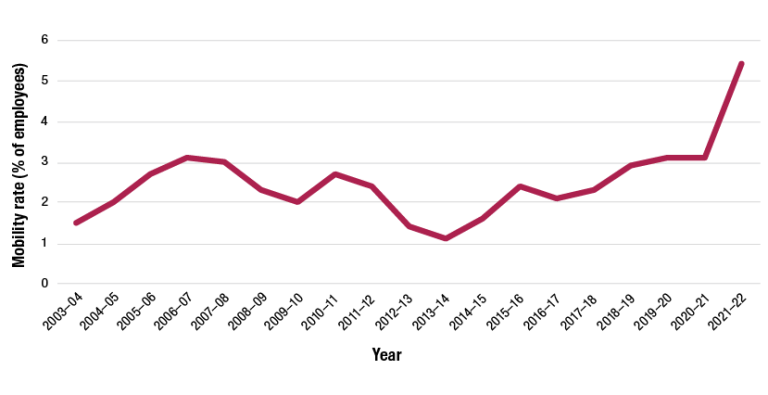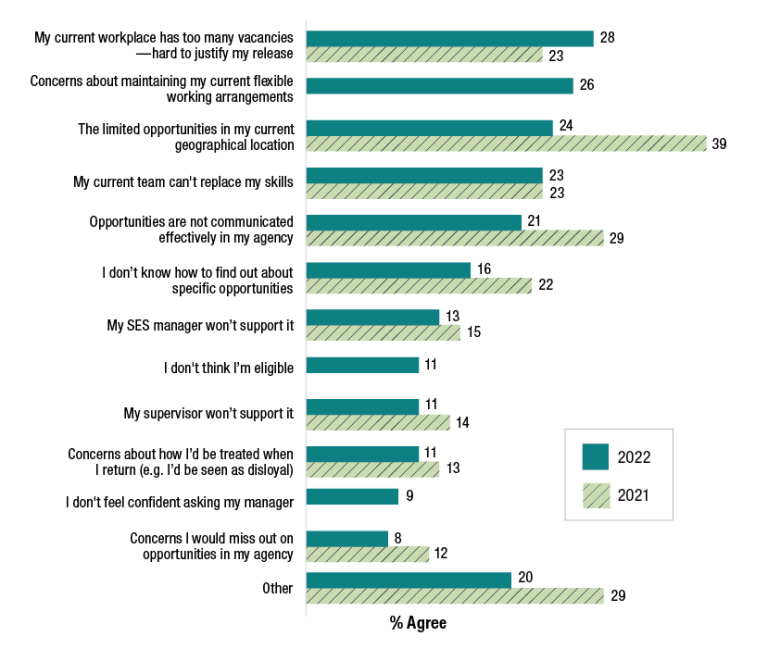4.5 Mobility
Mobility enhances the capability of employees and organisations. Exposure to different roles and workplaces increases employee skills and experience. The array of work in the APS is also one of its attractions. On an organisational level, mobility encourages new thinking and the contestability of ideas, and brings fresh perspectives to complex problems. Mobility is also a way for organisations to quickly find the staff they need to respond to a sudden surge in demand for services. That said, mobility is not for mobility’s sake. The service needs deep expertise and continuity and, as such, movement needs to work for the system and the individual.
The APS surge reserve
Initially established in response to the bushfires of the 2019–20 Australian summer, the APS Surge Reserve is now a mechanism for deploying people within short timeframes to meet critical workforce needs and support delivery of essential public services. It also acts to broaden professional experiences and develop new networks across the APS.
At the forefront of helping the Australian community during times of crisis, in 2021–22, the APS Surge Reserve was called on three times:
- In January 2022, some 500 APS staff from 19 agencies were deployed to assist Services Australia to process over 730,000 COVID-19 pandemic leave claims arising from the Omicron strain impacting across Australia.
- In March 2022, extreme weather events across Queensland and NSW saw over 500 APS staff from 18 agencies assist Services Australia to deliver the Australian Government Flood Disaster Recovery Payment, with more than 1.3 million claims paid.
- In May 2022, over 1,000 APS staff from six agencies were deployed to assist the AEC with the Secure Telephone Voting Service. This support enabled over 70,000 individuals affected by COVID-19 to use the service to cast their vote in the 2022 Federal election.
The APS is continuing to revise its practices to improve deployment timeframes. To date, activation of surge can take an average of 13 to 17 days to achieve the requested number of nominations.
To ensure preparedness, new initiatives to support rapid deployment of the APS Surge Reserve include:
-
Pre-registration: APS staff will be invited to register their interest to participate using a digital platform which will provide accurate, single source and consistent data, and allow for communication to be delivered consistently and in real time.
-
Preparatory training: All reservists, before deployment, receive ‘baseline’ training – available centrally on APSLearn. This approach creates efficiencies by facilitating best- fit placements.
-
Recognition: All reservists are recognised for their contribution and for promoting the benefits of the Reserve.
APS staff on the move
During 2021–22, more ongoing APS employees moved between agencies on a permanent basis than had done so in each of the previous 20 years.39 This movement excluded APS Surge Reserve and other temporary transfers. This coincides with an increase in ongoing employees (5%) across the APS over the same period, which points to greater opportunities for movement.
A total of 7,360 or 5.4% of ongoing employees moved to another agency within the APS by a permanent transfer or as a promotion (Figure 4.2). Comparatively large proportions of ongoing employees moved to small (10%), medium (9%) and large (10%) agencies during 2021–22. However, the mobility rate of those in extra-large agencies (2%) was far lower, likely due to the larger set of roles and functions available within extra-large agencies, offering employees more internal mobility opportunities.40
Figure 4.2: Mobility rate of ongoing APS employees (2003 to 2022)

Source: APSED
While permanent staff transfers and promotions between agencies are a key component of employee mobility within the APS, more recent focus has been applied to enabling temporary mobility. The APS Mobility Framework [41] was released in 2021 giving APS employees practical guidance on how to use temporary moves to experience new employment challenges, improve capability and facilitate career progression. One-third (34%) of respondents to the 2022 APS Employee Census had taken a temporary move at some time over the previous 3 years. While most of these were made within the respondent’s agency (81%), one-fifth (19%) were to a different APS or Commonwealth government agency.
It is encouraging that, when compared to 2021, smaller proportions of employees in 2022 are identifying a lack of awareness (16%; 22% in 2021) and ineffective communication (21%; 29% in 2021) as barriers to seeking temporary movements (Figure 4.3). This suggests that initiatives such as the APS Mobility Framework and the Temporary Opportunities Jobs Board are having a positive impact on short-term mobility in the APS.
Figure 4.3: Perceived barriers to seeking a temporary move (2021 to 2022)

Source: APS Employee Census
One principle of the APS Mobility Framework is to offer temporary moves as widely as practical, including outside the APS, to promote links between sectors and sharing of ideas. For example, the Department of Foreign Affairs and Trade supports Australian participation in the United Nations Junior Professional Officer Program, which gives young professionals the opportunity to gain hands-on experience in multilateral technical cooperation and international development.
However, temporary moves between the APS and non-government sectors are rare. In 2022, only 1% of employees who had taken a temporary move had gone to a private, not- for-profit or academic employer. This is consistent with previous years. The Future of Work Sub-committee of the Secretaries Board is looking at ways to promote a more porous and connected workforce as part of planning for a future-ready APS.
Capability reviews
To reinforce capability at the organisational level, implementation of agency capability reviews [42] will be prioritised as part of the Government’s APS Reform agenda.
These reviews are intended to embed a culture of continuous improvement and to ensure the APS is building and maintaining the right capabilities to respond to challenges now and into the future.
The proposed new approach builds on the program of APS capability reviews conducted between 2010 and 2016. It is informed by lessons learned from international, state and territory experiences – specifically, the work of the New Zealand Performance Improvement Framework and Western Australian Agency Capability Review Program.
Capability reviews are future focused and will enable individual agency reviews and cross- cutting thematic reviews. This approach will be based on Government priorities and designed to identify capability needs in areas such as: whole-of-government collaboration; transparency and integrity; and culture and behaviours. A pilot will begin in late 2022 and then evaluated to inform the future direction. A pilot will begin in late 2022, and will then be reviewed to inform the future direction.
Evaluating performance
A connected and effective APS can only be maintained if critical outcomes are examined, agencies and employees learn from experience, and continuous improvement is embedded into decision-making and everyday practice.
Work has started on strengthening evaluation across the APS, through the Commonwealth Evaluation Policy launched by the Department of Finance on 1 December 2021. Over 40 Commonwealth entities and external stakeholders collaborated on its development. The policy anchors evaluation within existing public sector frameworks established under the Public Governance, Performance and Accountability Act 2013. It embeds a culture of learning from experience, improving the impact of programs through evidence-based policy and delivery, and supporting Commonwealth agencies to improve performance reporting. An associated toolkit provides practical guidance and builds agency capability.
To strengthen the Strategy, Policy and Evaluation craft, the APS Academy has partnered with the Department of Finance to support the release and ongoing promotion of an Evaluation Toolkit. The toolkit offers a range of templates, tools and additional resources to support people who are new to evaluation, with an overview of evaluation concepts and approaches.
Under the APS Reform Plan, the Department of Finance is now establishing a Commonwealth Evaluation Community of Practice to provide a network to help embed the Commonwealth Evaluation Policy and the Evaluation Toolkit. The community of practice will create opportunities to share perspectives and experiences about how the policy and toolkit are being operationalised in different contexts.
Footnotes
[41] APSC, APS Mobility Framework, 29 April 2021.
[42] Commonwealth of Australia, Our Public Service, Our Future. Independent Review of the Australian Public Service, 13 December 2019, Recommendation 2A.



